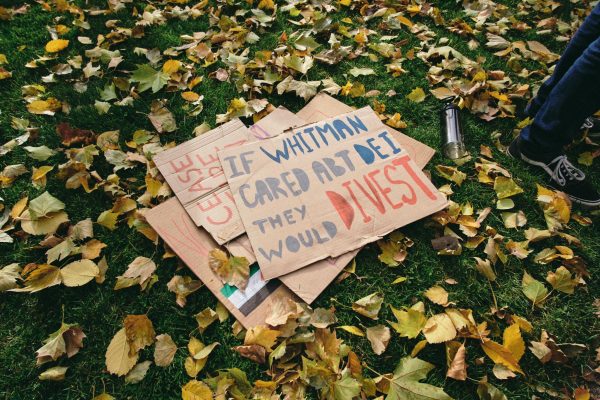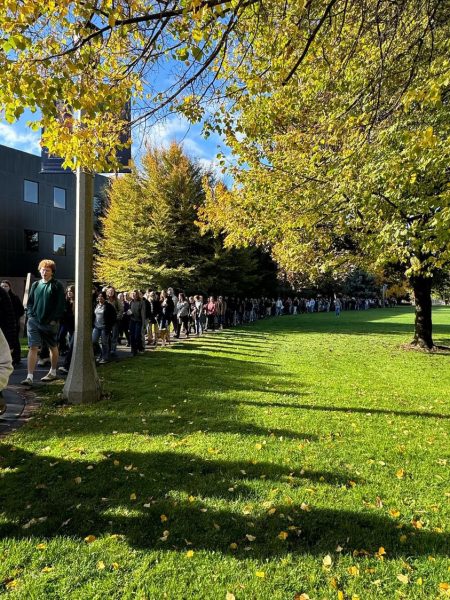Administration considers socially responsible investing
November 5, 2015
Where does your money go? To Google or Monsanto? Whitman students have never had a firm grasp on where the college’s money is invested, much less any say in the College’s financial practices. That may be about to change.
A group of students, composed of members of Divest Whitman, the Whitman Investment Company (WIC), and the Associated Students of Whitman College (ASWC), met with President Kathy Murray and CFO and Treasurer Peter Harvey on Oct. 22 to discuss Whitman’s adoption of a socially responsible investment framework. If Whitman had one of these frameworks, managers of the college’s investments would have to meet some basic ethical standards, or risk losing their business with the college.
The proposal process came out of conversations between students and administrators regarding divesting from fossil fuels. Junior Dani Hupper, ASWC Sustainability Director and an active member of Divest Whitman, has been one of the major drivers behind this proposed change.
“In reference to divestment, most administrators have said, ‘We’re not in support, not ready to divest from fossil fuels in the way that you propose at this time, but we are willing to create a socially responsible [investment] framework.’ And we saw that momentum, and we saw that ability or potential of collaborating with the administrators and decided to run with it,” Hupper said.
Socially responsible divestment frameworks can take a variety of forms. At the meeting with Murray and Harvey, the students proposed three different options. The Whitman Investment Company representatives, senior Phil Chircu, and junior Kincaid Hoffman, pitched a framework based on Environment, Social, Governance (ESG) criteria, a metric used by Goldman Sachs to determine a company’s level of ethics. This framework could be implemented by outside managers, or by using the ratings generated by Goldman Sachs based on a holistic appraisal of a company’s ethical practices. The model proposed would set aside a percentage of the College’s endowment to be managed by ESG investors.
Mitchell Cutter, ASWC Ombudsperson and member of Divest Whitman, proposed a more binding alternative, which could draw on ESG or similar triple bottom line standards, but would still allow the college to design its own framework. This model would require that all non-blind funds, that is all funds in the hands of managers that disclose their investing practices to Whitman, be evaluated by a committee whose job would be to determine whether or not to divest from companies who violate the framework. Three of Whitman’s peer institutions, Macalester, Rhodes, and Dickinson, have subcommittees or task forces whose job it is to evaluate. However, neither of these two more radical approaches seem likely at this point.
“The idea isn’t so much to follow the triple-bottom line [or] the ESG approach, more to design our own framework, to have considerations for social responsibility,” Chircu said.
Since the plan is still in the early stages, there is no definite idea of what the framework might look like. Hupper’s pitch, which was the least restrictive, met with the most support from administrators. She suggested a definition of social responsibility be crafted in-house by a committee, which would likely be chaired by Peter Harvey and contain students representing a variety of environmental and social justice issues and Board of Trustees. The new restrictions would only apply to new investments, and a process would be put in place to judge options. Students would need to prove that divesting from a company would have a “meaningful impact.” All final decisions will still need to be approved by the Board of Trustees.
If Hupper’s suggestions are adopted, the framework could set up future conflict over what “meaningful impact” looks like. Chircu maintains that divestment, from fossil fuels or other industrial players whose operations are incompatible with Whitman’s ethics, is not always about making economic waves.
“Now, is any one particular investment on the part of Whitman and its endowment going to change the operations of a huge multi-million, multi-billion dollar company?” Chircu asks, “No. But, I think that was never the point.”
Meaningful impact could be ethical incompatibility with Whitman’s professed commitment to citizenship and social responsibility, or it could mean having a literal financial impact on a company. If financial impact is the standard, it may prove impossible for any investments to meet the framework’s requirements, as individual institutions’ divestments are rarely enough to influence large corporations’ overall holdings. The fossil fuel divestment movement is built on the idea of divestment damaging fossil fuel companies’ public image so that politicians are more likely to take political action to curb emissions.
Seven of Whitman’s 13 peer institutions have socially responsible investment frameworks. Most of them resemble the flexible model proposed by Hupper. This is largely due to practical considerations. Whitman’s investment committee chooses managers to invest and reinvest their funds. Peter Harvey explains that Whitman administrators have very little control over the process.
“We cannot tell [managers] what companies to invest in, or not,” Harvey said, “and we are a small piece of any manager’s funds. Many of these are billion dollar plus managers and we maybe have 15 or 20 million dollars so we don’t have that control.”
Moving forward, the students are awaiting the outcome of the November Board of Trustees meeting, where President Kathy Murray will present this iteration of a socially responsible investment framework to the Trustees.
The administration is certainly entertaining the idea, partially because it does not require completely reallocating the College’s investments.
“It … meets administrative needs if it gives a framework so that we all know how decisions are made, and that provides transparency and while people may not like the decisions that are made, for example a number of colleges that have such a framework have considered divestment and haven’t done it,” said Peter Harvey, “but at least there’s a process [students] can understand and participate in.”








